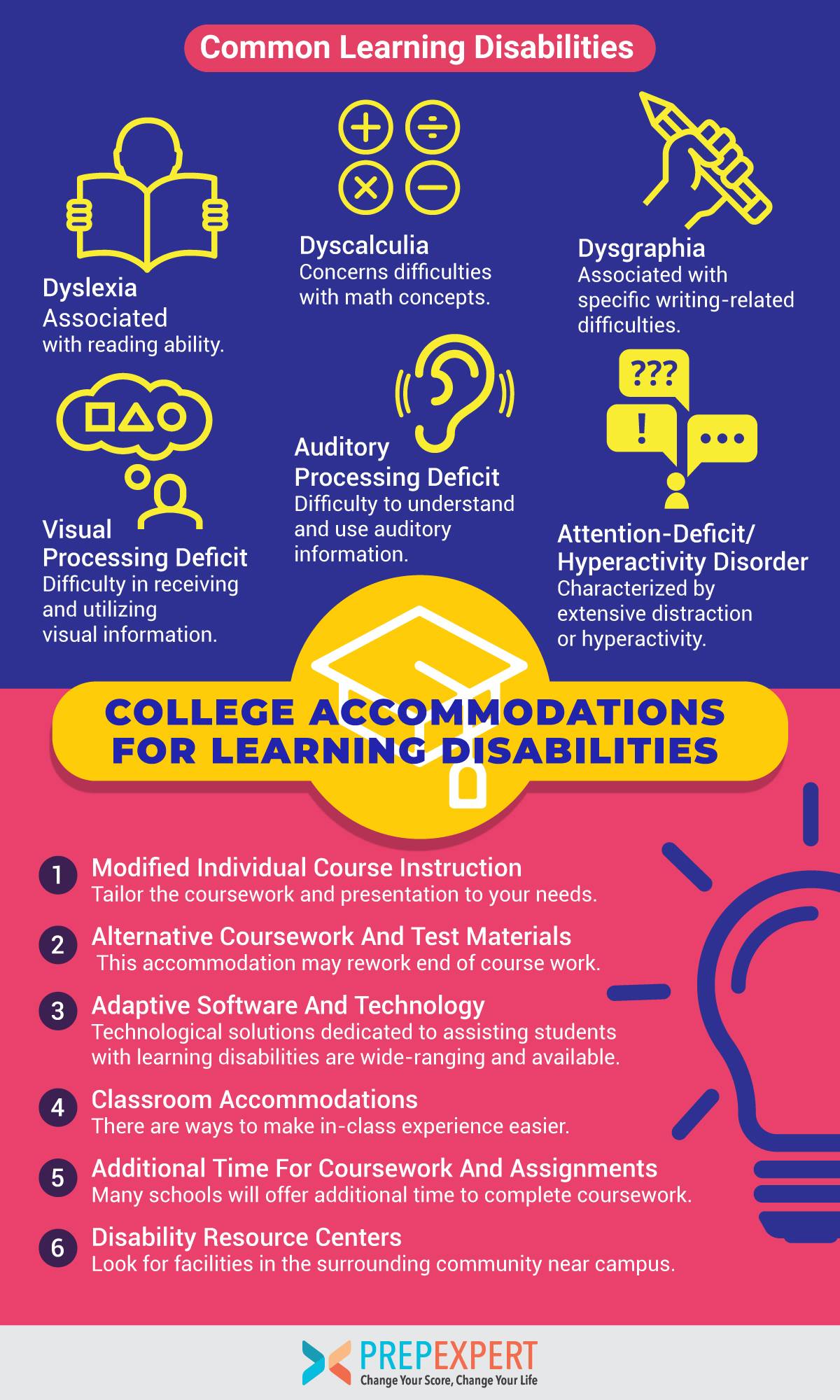According to research conducted by the National Center for Educational Statistics, approximately 13% of students told their college about a learning disability in 2016—while 22% admitted they had a disability but did not tell their school. While LD students contend with difficulties that other students do not, it’s still possible for them to attend college and be successful. If you have a learning disability and are unsure how you can successfully navigate college, be sure to look out for these accommodations during your college search or inquire about them with your school.

Infographic by Prep Expert
Common learning disabilities
- Dyslexia: Associated with reading ability
- Dyscalculia: Concerns difficulties with math concepts
- Dysgraphia: Associated with specific writing-related difficulties
- Auditory processing disorder (APD): Difficulty to understand and use auditory information
- Visual processing disorder (VPD): Difficulty in receiving and utilizing visual information
- Attention-deficit/hyperactivity disorder (ADHD): Characterized by extensive distraction or hyperactivity
College accommodations for learning disabilities
Most colleges and universities have resources and staff in place to help students with learning disabilities receive the assistance they need to succeed. A variety of accommodations are available for assisting students with attending classes, completing coursework, taking exams in a format that suits their needs, and more. It’s always important to do research beforehand to figure out what prospective colleges and universities offer and whether or not they’ll suit your specific needs.
Modified individual course instruction
Some schools will offer modified course instruction to help tailor the coursework and presentations to your needs, in which case adjustments can be made to things like course content, content presentation, and the learning environment. The goal is to present the same information but in such a manner that makes it more accessible without sacrificing necessary information.
Related: How Can I Improve My Grades With a Learning Disability?
Alternative coursework and test materials
This accommodation allows for either course exams or final projects to be adjusted in order to allow students alternative means of expressing their class comprehension. Initiatives such as the Universal Design of Instruction exist to promote creating highly accessible courses across the spectrum of learning styles.
Adaptive software and technology
Technological solutions dedicated to assisting students with learning disabilities are wide-ranging and available, so be sure to ask about them. Common examples include:
- Stress management tools
- Software to help easily process text
- Recording devices for lectures
Check with on-campus services to see what equipment and software they have readily available for class assistance.
Classroom accommodations
There are ways to make in-class experience easier. These are some of the most common in-class accommodations you can request:
- An assigned scribe or note-taker
- An in-class assistant
- Easily accessible seating
- Quiet classroom space for exams
Again, one or more of these options are normally available upon request at many colleges.
Additional time for coursework and assignments
Once a student discloses their specific disability to the proper department, they may be eligible to request additional time to complete coursework and exams. For example, if a student responds better to an oral examination, then that request can potentially be fulfilled.
Disability resource centers
Look for facilities in the surrounding community near campus. Very often, disability resource organizations in a particular city will establish partnerships with schools. These partnerships help facilitate learning disabled students to receive additional help and services without putting additional stress on the school itself.
Related: 5 Great Campus Resources Students Should Know About
As you can see, LD students have a lot of options when it comes to accommodations for learning differences in college. Don't be afraid to speak up about your disability and request the services you need to succeed. These programs are in place to help every student on campus get the most out of their education.
Read the original post on Prep Expert's website, and start looking for schools that meet your needs with our College Search tool.








